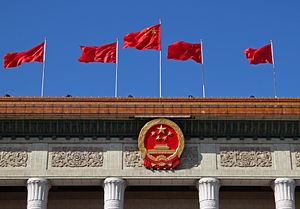Although the Chinese Communist Party (CCP) has always emphasized compliance with its center, Party discipline has become more important than ever as China struggles to meet its goal of realizing a “moderately prosperous society in all respects” by the year 2020. Without disciplined Party members, efforts to develop a new growth model—one based on domestic consumer spending, innovation, and services—is likely to stall in the face of vested interests. Such interests have become deeply ingrained after years of leadership atrophy within local CCP groups, in large part the result of local Party committees focusing more on entrepreneurial endeavors than Leninist ones.
Although the CCP has sought to reverse this trend since 2002 through the devotion of significant resources and Party building campaigns, Xi Jinping has recently revamped efforts to whip cadres into shape through educational programs that complement his anti-corruption drive. It appears that the current discipline education paradigm carries out a two-pronged approach: mandating rigorous CCP education across the Party membership as a whole, and educating leading cadres stationed throughout the party-state apparatus.
To foster conformity and discipline among the CCP’s 87 million members, the CCP General Office launched a new education program in February 2016 named “Study the Party Constitution and Party Regulations, Study its Speech Series, Be a Qualified Party Member,” better known as the “Two Studies, One Action” (“两学一做”) plan. As the plan’s title makes clear, the first “study” requires all CCP members to understand the CCP constitution and its related rules. However, the second “study” places a strong emphasis on studying Xi’s speeches on topics ranging from economic reform efforts to national defense. According to statements made by United Front Work Department Minister Sun Chunlan during an April 2016 “Two Studies, One Action” convention, the plan emanates down from the CCP Central Committee to the entire Party body, and mandates strict governance and the protection of the CCP’s “vanguard image.” More importantly, Party members are to act in ways that conform to these set standards (the one “action”).
Nevertheless, focusing on leading cadres in key positions seems to have been deemed even more important to ensuring Party discipline. These cadres are viewed as the “critical few” (关键少数), a term that was first introduced by Xi at a study session in February 2015 and has been used many times since. The Central Commission for Discipline Inspection (CCDI), the Party’s disciplinary organ, has made routing out corrupt cadres in the ranks of the “critical few” a top priority, with CCDI data showing that the majority of its recent investigations focused on suspects that are in (or have previously held) leading positions.
To complement the threat of CCDI punishment, Xi released another directive in February 2016 for all Party committees to study his comments on Mao Zedong’s work, “The Party Committee’s Work Methods” 《党委会的工作方法》, a document that explains the leadership duties of committee secretaries and their subordinate committee members. Powerful state organs, such as the State Administration of Press, Publication, Radio, Film, and Television (SAPPRFT), have already responded by holding large study sessions on the document.
The overall result is the mandatory study of Xi Jinping’s discipline-related expectations by both Party committees and their subordinates alike. Whether or not efforts to intrinsically ingrain discipline into Party members will work over the long run remains to be seen. Even so, these education plans appear to be the softer side of enforcing Party discipline, with the CCDI remaining the more powerful external impetus for CCP conformity in the foreseeable future.
David Gitter is the editor and Great Helmsman of PARTY WATCH, the premier weekly intelligence report on the activities of the Chinese Communist Party.

































